Factories in Nghe An: What to do about warnings of poisoning in workers' kitchens?
(Baonghean) - Currently, the awareness of organizations, individuals doing business and operating collective kitchens has been raised; most establishments fully comply with food safety regulations. However, the risk of poisoning still exists when many units make mistakes in their awareness of ensuring food safety...
There are many risks.
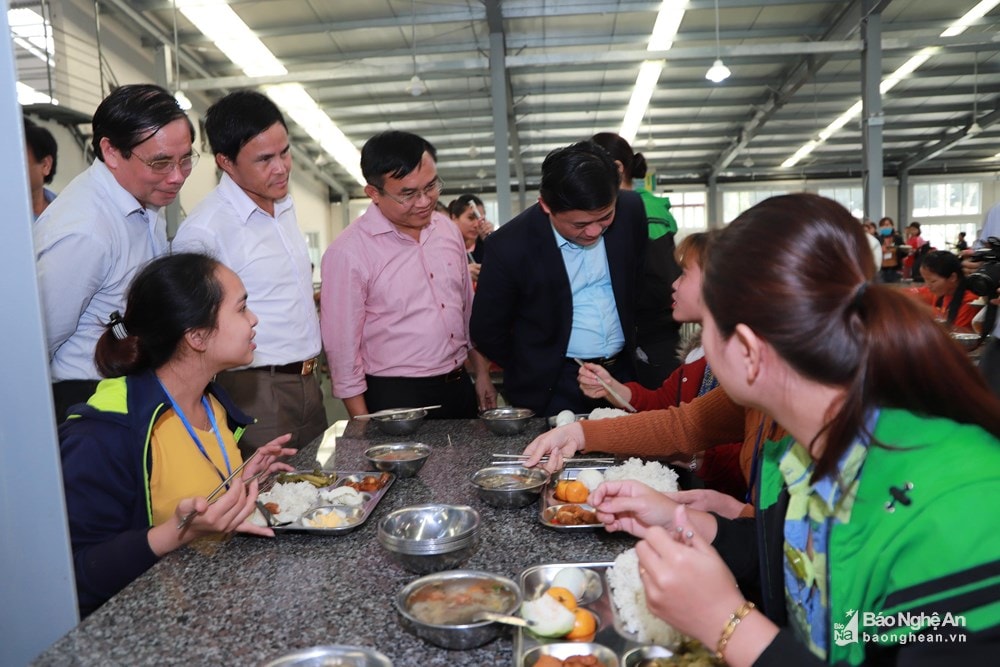 |
| Provincial leaders inspect food safety during meals at the garment factory of Minh Anh Garment Joint Stock Company - Do Luong. Photo archive |
In recent years, Nghe An has had a number of mass poisoning incidents at factories and enterprises. Although the number of incidents is not many, the number of people affected is very large, typically: On January 8, 2015, hundreds of workers at Nam Sung Vina Garment Company, Dien Hong Commune (Dien Chau) suddenly showed symptoms of nausea, diarrhea, and dizziness. 206 workers had to be hospitalized at the district hospital and nearby clinics.
After 1 day of intensive treatment, the poisoned workers have recovered. Authorities have taken food samples to send to the Central laboratory for analysis to find the cause.
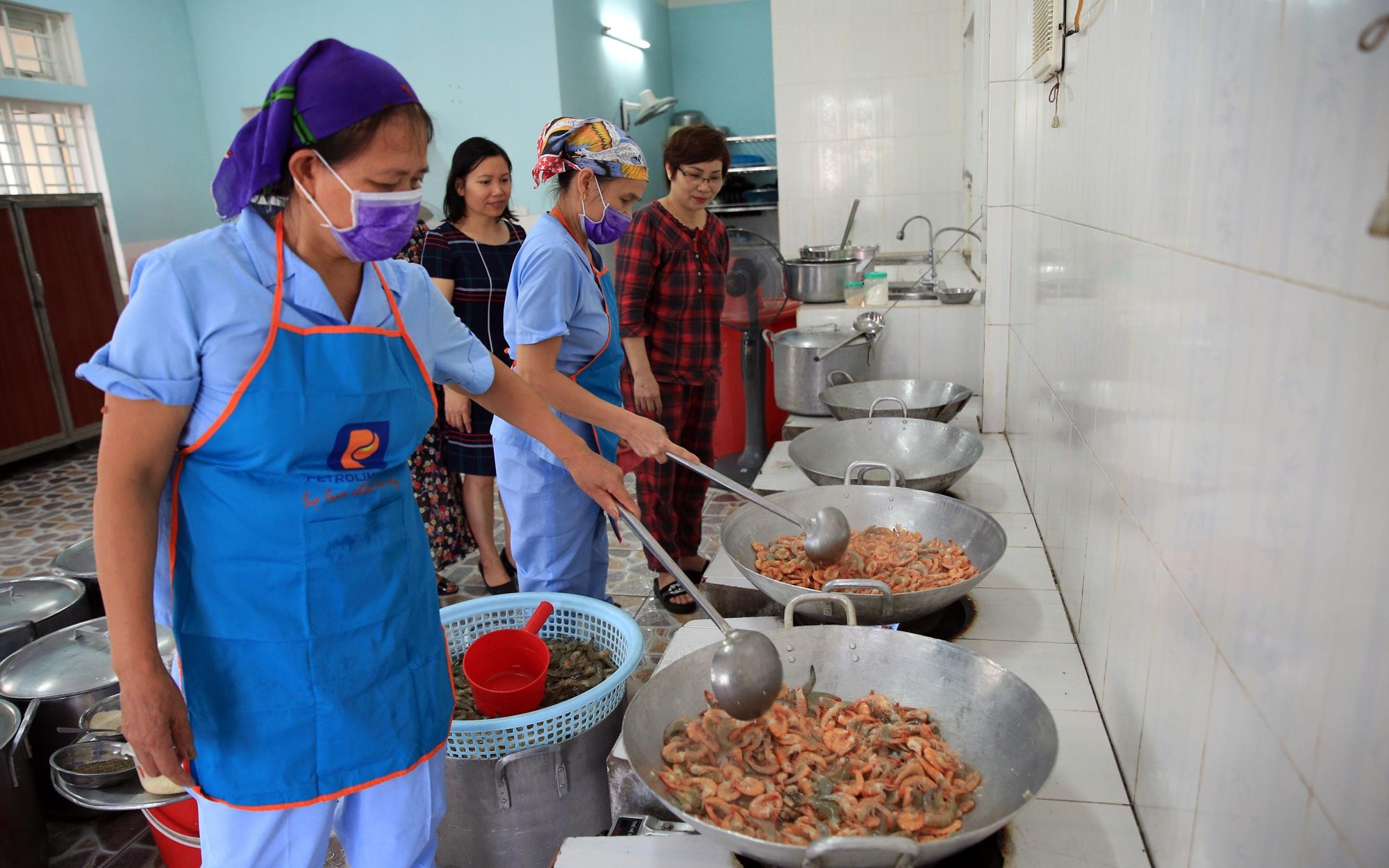 |
| Chefs prepare lunch for children at Trung Do Primary School, Vinh city under the supervision of parents. Photo courtesy of Ho Phuong |
On April 1, 2017, at BSE Vietnam Electronics Co., Ltd. (Nam Cam Industrial Park, Nghi Loc District), a mass poisoning incident occurred, 50 workers had to be hospitalized for treatment.
After the incident, the authorities approached and investigated the kitchen and took 12 samples for testing (including: 07 food samples, 02 milk samples, 01 orange sample, 01 drinking water sample and 01 water sample used to prepare food) and 16 air samples. These samples were then sent to domestic laboratories.
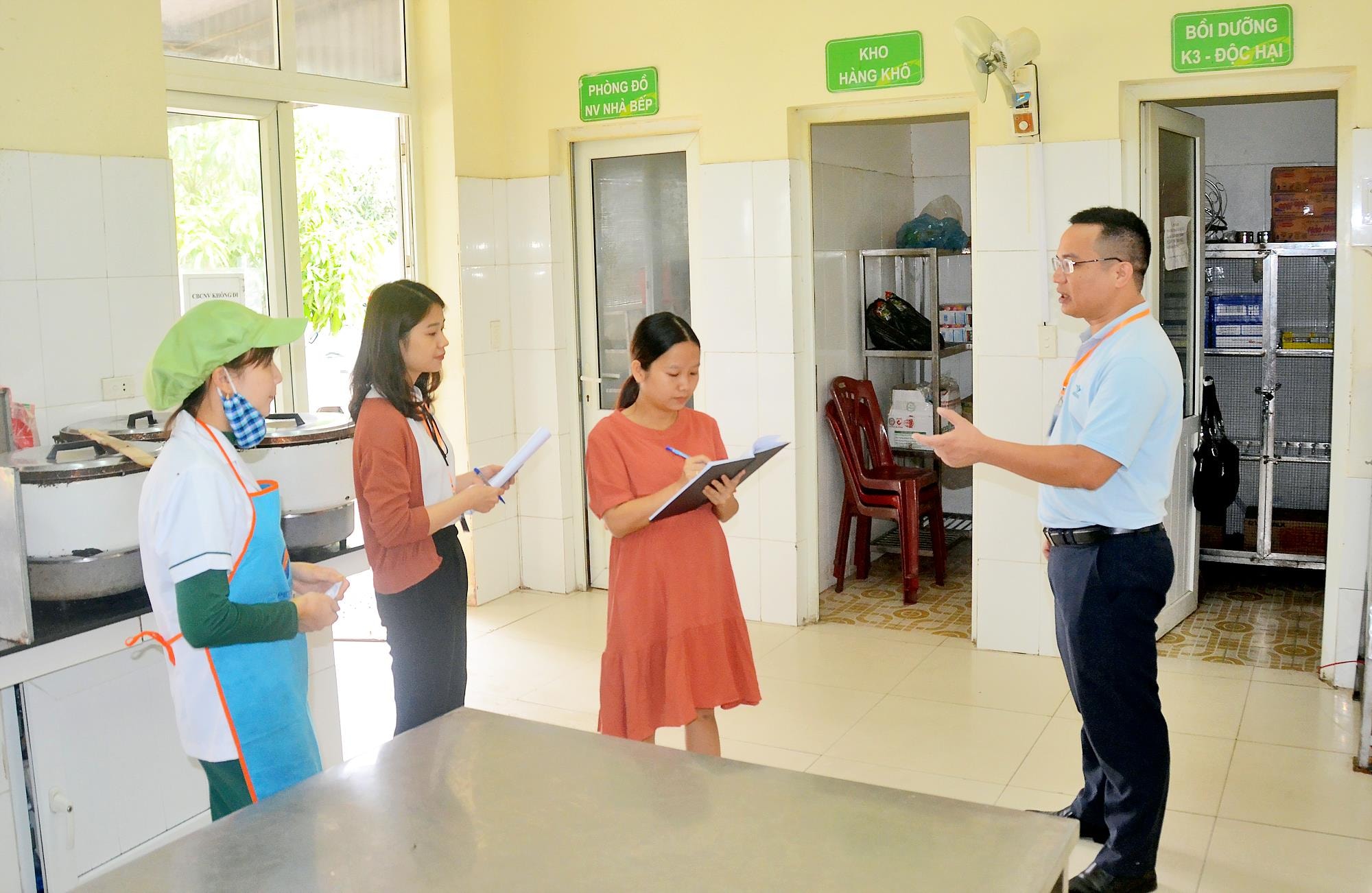 |
| Instructions for implementing a pilot model for Tien Phong Plastic Company in Nam Cam Industrial Park. Photo: Thanh Son |
On May 22, 2017, at Hitexvina Garment Factory, HI-TEX Company Limited (Nghia My Industrial Park, Thai Hoa town), a poisoning incident occurred, causing 70 people to be hospitalized.
Previously, the Garment Factory's kitchen was twice requested to stop operations by the Nghe An Food Safety and Hygiene Department and the Thai Hoa Town People's Committee due to not meeting food safety conditions.
Most of these mass poisonings were caused by microorganisms and some others had unknown causes. The unknown cause was that the collective kitchens did not keep food samples - the basis for the authorities to determine. Thus, it is clear that mass poisonings occurred because the kitchens lacked awareness of safe food preservation and processing.
In 2018 - 2019, Nghe An did not have any mass poisoning incidents at any factories or enterprises. However, that does not mean that the risk of poisoning has been eliminated. From February 19 to April 9, 2019, the Nghe An Provincial Department of Food Safety and Hygiene conducted specialized inspections on food safety at collective kitchens in factories and industrial parks in the area. The Department inspected 28 establishments and fined 2 establishments with a total amount of 16 million VND.
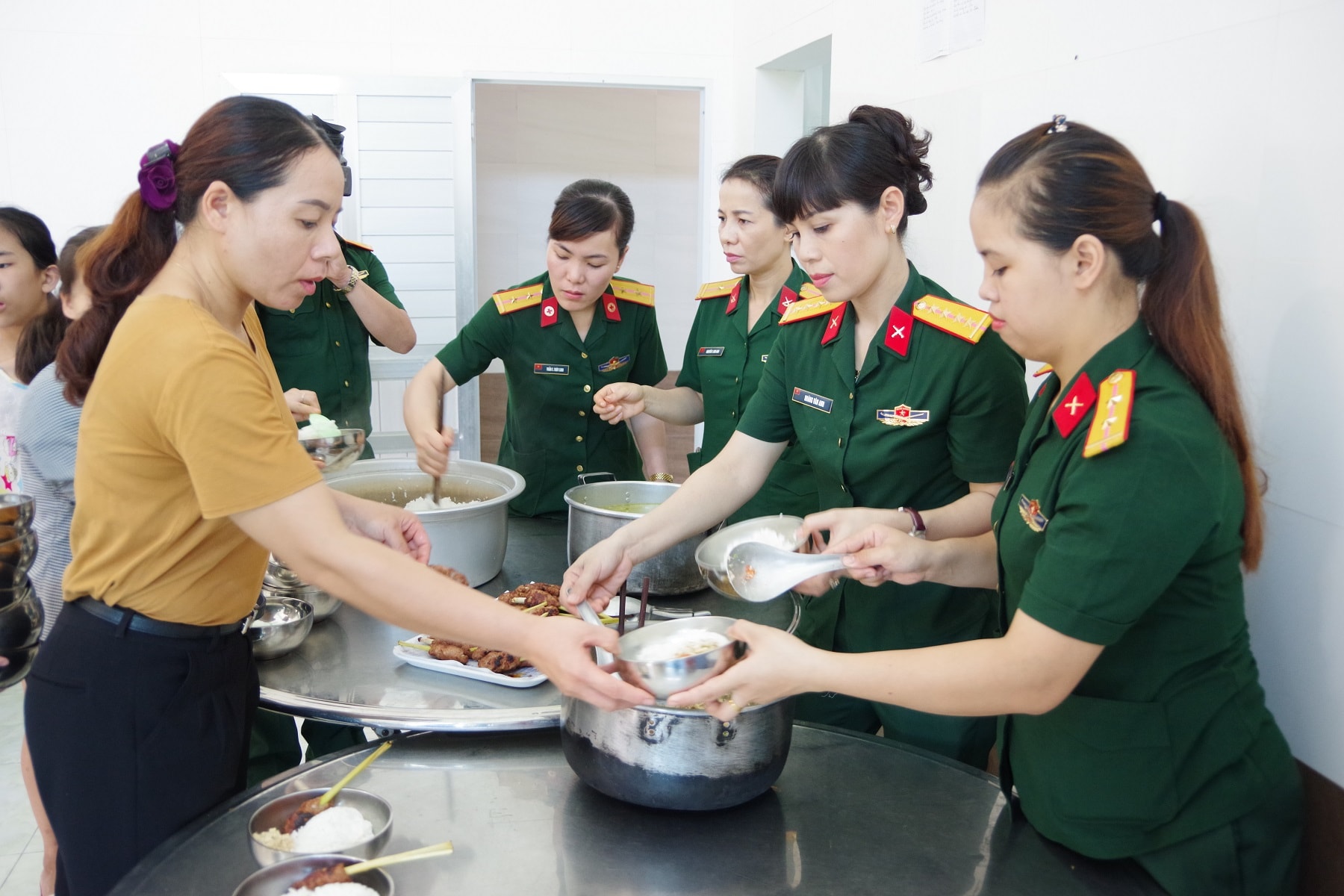 |
| The nutritious meal is an annual activity organized by the Women's Union of the Provincial Military Command every month at the Mother Teresa Center for Orphans and Disabled Children. Photo courtesy of Phuoc Anh |
Among the two establishments that were fined, there was a familiar face: Nguyen Thi Loan Business Household (operating the collective kitchen of HI-TEX Company Limited, Nghia My Commune, Thai Hoa Town). The remaining establishment that was fined was Trung Do Joint Stock Company (collective kitchen of Granite Factory - Trung Do Joint Stock Company, Trung Do Ward, Vinh City).
The violations of these two establishments are "not new", including: Not implementing and not properly implementing the legal regulations on the 3-step food inspection regime according to Decision No. 1246/QD-BYT dated March 31, 2017 of the Ministry of Health (before food processing, during food processing and before eating); not properly implementing the legal regulations on food sample storage...
The above violations are all violations of consciousness. This shows that food safety and food poisoning depend largely on the awareness and conscience of business owners and collective kitchen operators.
Building a "spot kitchen"
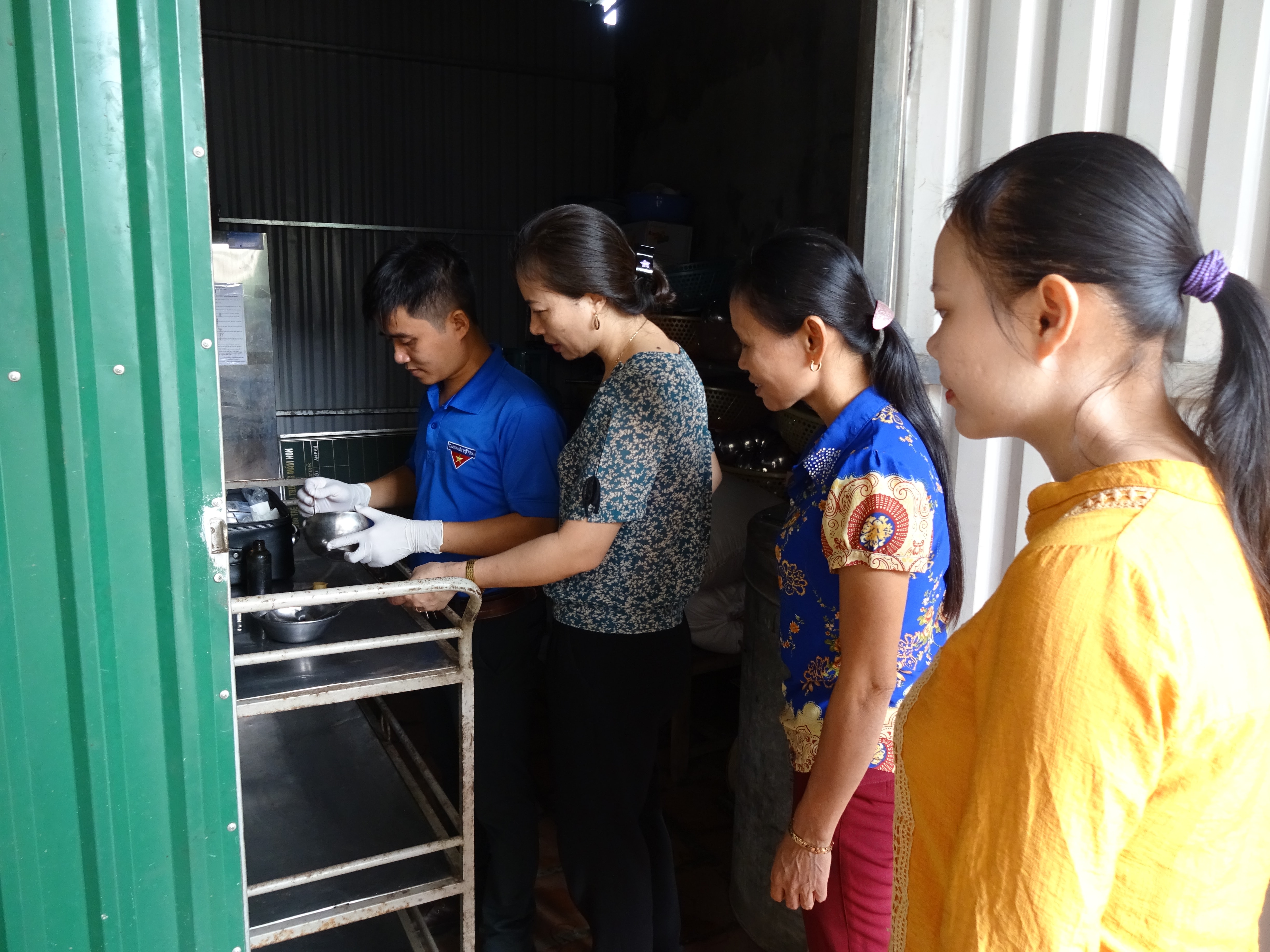 |
| Officers of the district food safety inspection team are conducting a quick test of bowls and chopsticks at the communal kitchen of My Thanh Commune Kindergarten. Photo courtesy of Thai Hong |
Recently, the provincial authorities have proposed many solutions such as enhancing training for subjects and owners of food processing facilities in their jurisdiction. Districts, cities and towns also carry out similar tasks.
The Health sector regularly conducts monitoring activities for kitchen facilities in the area; annually, organizes 6-7 specialized inspection teams such as bottled drinking water, food services, functional foods, and collective kitchens; directs districts, cities, and towns to conduct inspections and supervision according to decentralization; proactively purchases samples for monitoring and analyzes quality to provide warnings to management units and handle promptly.
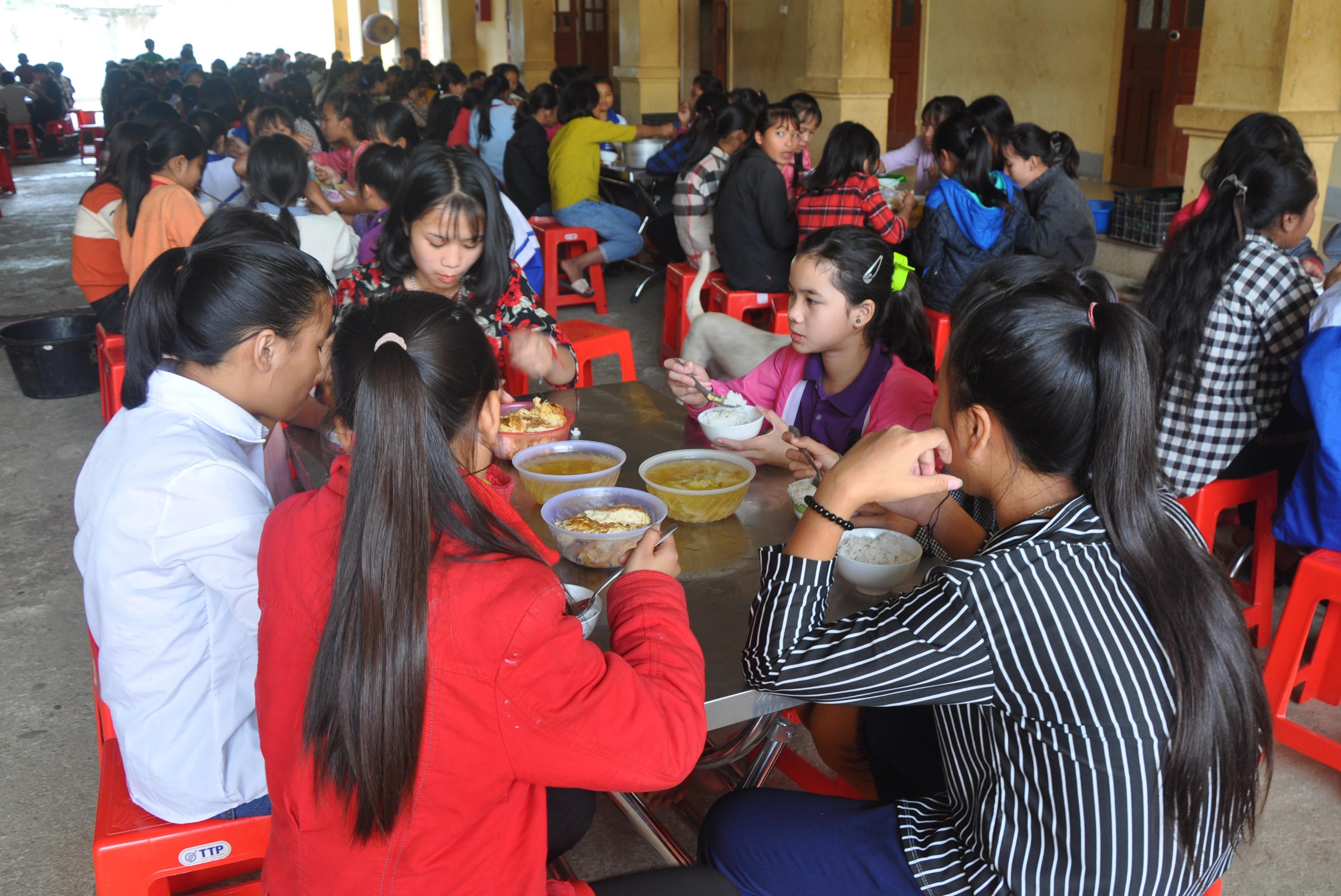 |
| Meals of students at Luong Minh Boarding Secondary School (Tuong Duong). Photo: Document |
Following the direction of Nghe An province, the authorities are trying to focus on limiting it from the beginning. The authorities can apply post-inspection, supervision and continuous reminders... the problem is that we need to thoroughly understand the idea of "even if it is difficult, we must do it".
According to Dr. Pham Ngoc Quy: To ensure food safety in collective kitchens, there must be synchronous participation from many sides. The economic zone management board needs to regularly strengthen the dissemination of legal regulations on food safety to facility owners and people directly involved in the production, processing, and trading of food and catering services; coordinate with competent authorities to strengthen the inspection and supervision of collective kitchens in factories and industrial parks within the scope of management. Owners of collective kitchens must regularly monitor the compliance with legal regulations on ensuring food safety at the unit.
When implementing the pilot model, each collective kitchen and restaurant in the hotel will be provided with a 3-step food inspection book and a food sample storage book by the Health Department; equipped with various types of posters and billboards to promote food hygiene; equipped with 01 set of food sample storage tools and 01 set of gloves, aprons, masks, hair caps...
Currently, Nghe An Department of Health has been implementing the model of "Collective kitchens and restaurants in hotels meeting food safety conditions" at establishments that are not subject to the issuance of certificates of qualified establishments in Nghe An province. This is considered a new solution to limit the risk of food poisoning in collective kitchens.
On March 5, 2019, the Nghe An Department of Health issued a plan to build a pilot model. Accordingly, based on the list of collective kitchens and restaurants in hotels proposed by the health department (health center) of districts, towns and cities, the Nghe An Provincial Department of Food Safety and Hygiene will conduct an assessment and select facilities to build a pilot model. The implementation period starts from March to the end of October 2019. After implementation, the health sector will establish a council to evaluate and recognize the pilot model.
It is expected that the whole province will have 96 pilot models. Of which, the provincial pilot model is 20 collective kitchens belonging to companies and restaurants in hotels. The district pilot model is 76, mainly collective kitchens in schools. The health sector hopes that the pilot model will create a boost in the awareness of units and functional agencies at all levels.
